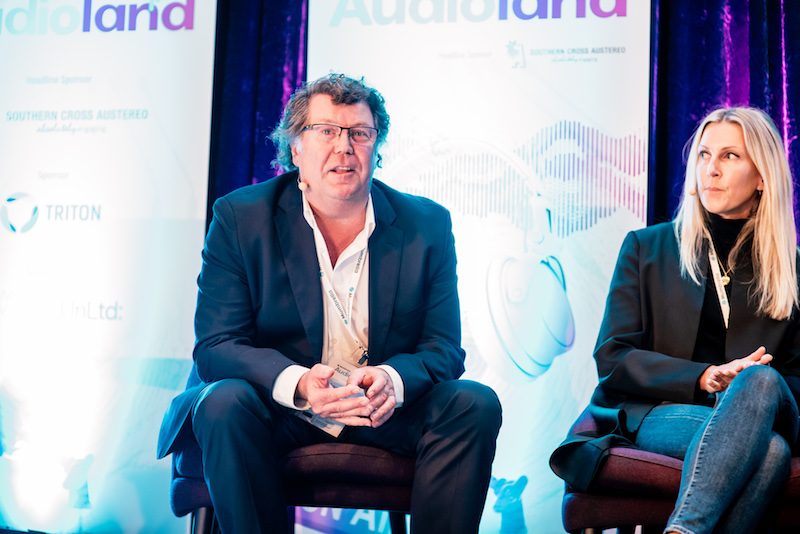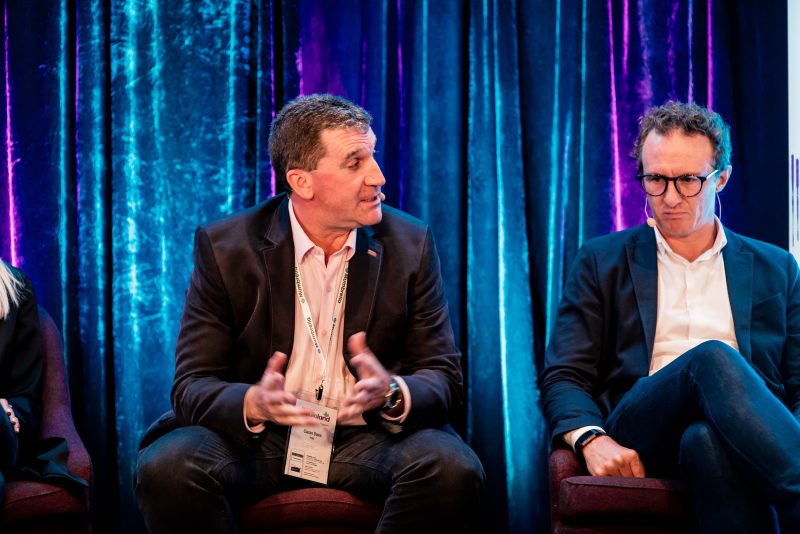‘Radio is ridiculously underpriced’: Audio bosses respond to accusation it costs too much
Commercial radio heavyweights have clashed with an audience member at Mumbrella’s Audioland who suggested that commercial radio was overpriced for advertisers since “it’s just news with a little bit of reactive content”.
Speaking on the keynote panel, HT&E CEO Ciaran Davis said he would respond first, but Grant Blackley, Southern Cross Austereo (SCA) CEO would “come in with the right hook”.

Southern Cross Austereo CEO, Grant Blackley, alongside Spotify head of ANZ sales, Cassie Gilbert at Mumbrella Audioland
“You talk about the audio ecosystem and everyone being friendly and nice and I think that’s awesome, because I’m a yoga teacher,” the questioner began.
“But, while people are listening to a podcast, they’re not listening to commercial radio. So the market is split in some respects. Commercial radio: do you think it’s overpriced for advertisers at the moment considering it’s just news with a little bit of reactive content?”
“Radio is ridiculously underpriced and undervalued, like, ridiculously,” Davis responded.
“We’re building up data sets. We’re building up knowledge of a consumer.”
“But it is fractured,” the questioner contested.
“It is fractured, but it’s better to be fractured within your own house,” said Davis. “Through the iHeartRadio app, we’re able to see when people are listening to live radio. People are listening to live radio, surprise surprise, [at] breakfast time, through the morning, increasing again at drive, tapering off in the evening.
“People are moving into podcasts and into artist radio, streaming services, later on in the day and at weekends. So, actually, it’s very complementary.”

HT&E CEO Cieran Davis speaking on the Audioland panel
Blackley agreed wholeheartedly, adding: “If we start from the position that there’s only a certain amount of listening and we have to split it up, I think we’re starting at the wrong place. Fundamentally, audio, as a segment, is growing.”
He pointed to evidence that SCA has seen 110m downloads of podcasts without negatively impacting its live radio model.
“If it had cannibalised all of our radio assets, we probably wouldn’t be here. It hasn’t. In actual fact, the baseline of our FM is stronger,” he said.
“We use that as a megaphone to create new listening, incremental listening. I think there’s more people entering the audio sector than there ever has been before.
“And I will agree with Ciaran. We are vastly underpriced, but that’s really been a function of the industry probably not working as closely as we should have in years past. But that’s not the case today. We sit here, very much as comrades in arms, because the audio segment, as a total investment from marketers in the total pie, is underweight, and we have to get it to a better position.”

The keynote panel (L-R): Grant Blackley, Cassie Gilbert, Cieran Davis and Matthew Gain
But he reasserted that doing so isn’t a matter of assuming “there’s only one block of listeners in the world and we’re just going to cannibalise and cut that up, because I don’t believe that to be true.”
“We are expanding the pie.”
“We’re not using the full brains trust then,” the questioner interjected.
Blackley immediately disagreed. “I think we’re using the full brains trust to actually unlock exciting new audio.”
The rest of Blackley’s response was interrupted by murmurings that the questioner’s microphone should be taken away, to which Blackley said, “Yes, take the microphone from her,” to raucous laughter.
“And now that she doesn’t have the microphone, I’ll finish.”
Blackley and Davis were speaking on a panel with Spotify’s Cassie Gilbert and Audible’s Matthew Gain, with the group also discussing growing revenue (Blackley said SCA’s revenue is up 300-400%), whether there are too many podcasts (no, according to Blackley) and smart speakers.
“I’m excitedly terrified,” Davis said to laughs after everyone on the panel confirmed they’re excited by, rather than terrified of, smart speakers.
“Because, for anyone in radio in the room, it’s actually a huge challenge. We’ve got a station in Melbourne called Kiis101.1. That is an enormous challenge for a smart speaker, because it doesn’t understand what the point is. And many radio brands around the world have been successfully built, for a number of years, around sequential numbers that, at the moment, smart speakers don’t understand. And you’ve got one chance for the smart speaker to hit a search.”
Gain also drew laughs with his smart speaker wish list.
“I would love the smart speaker to be really smart, suggesting things to me. So like ‘Hey Matthew, I saw that you’re presenting at Audioland today, do you want a 20 minute podcast on how to do great public speaking’ or something like that. ‘We’re going to play your favourite ‘I’m too sexy’ song [by British band Right Said Fred] to amp you up,'” he joked.
“And that’s where I think the future may lead us.”
Ultimately, Davis was certain that Australia’s audio future is looking (and sounding) bright.
“Advertising follows consumer behaviour. So there’s absolutely no doubt that the revenue that will be generated from podcasting will be quite substantial in the next five years,” he said.
“It’s about communities, it’s about localism, it’s about engagement.
“Having had the privilege of working in 16 countries around the world, Australia’s radio is probably the most dynamic, forward-thinking, engaging, progressive, innovative mediums of any industry in the world. And that’s a credit to ourselves, to Nova, to SCA, who work really bloody hard.”



 Linkedin
Linkedin
Appalling and shows Grant and Ciaran remain as old school 80s style leaders. Thanks for reporting Mumbrella.
User ID not verified.
Mumbrella Audioland tickets must have been underpriced if the audience was made up of hard-question hitting yoga teachers.
User ID not verified.
Hi ‘Naysayer’,
I have updated the headline here, as Grant did make the microphone comment in jest about the audience member.
The article is 100% accurate – and reflects the spirit of the event – but the headline probably comes across as more aggressive than was intended.
The discussion did get heated, and Ciaran did promise a “right hook” from Grant, but I was 100% in control of who had the microphone, and who got to speak and when.
Thanks,
Vivienne – Mumbrella
So it’s ok to promise physical violence?
User ID not verified.
So you leave the headline up all day and once it’s served it purpose ( or most probably didn’t get the outpouring of anger you wanted) you decide to take it down?
You knew exactly what you were doing when you put the original headline up.
Very poor attempt and you should know better .
User ID not verified.
Hi Poor, the decision to run with the original headline was mine, not Vivienne’s. It was up for two hours.
Hope that clarifies things.
Paul Wallbank
I did not say that at all. Of course I don’t promote violence.
Ben, that yoga lady was funny! Overall the event was really well thought out and run. Hard hitting questions and entertaining, so credit to the Mumbrella team.
User ID not verified.